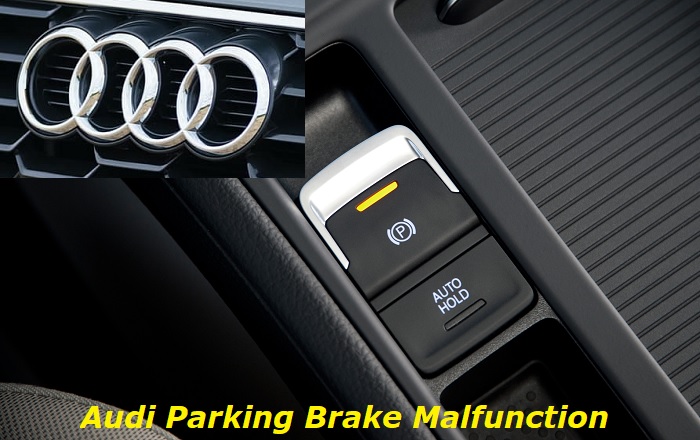Audi cars are well-known for their luxury and performance. Audi has a reputation for making high-quality, reliable cars that are fun to drive. Audi cars are also known for their stylish designs and advanced technology.
Parking brake malfunction message highlights
- Common reasons:electronics, brake fluid level, worn brake pads, parking brake switch issues
- How to fix:use scanner, check fluid, check pads
- Possible consequences:overall brake problems, no parking brake, parking pawl damage in transmission
- Priority level:High
- Can you drive?Not recommended
- DIY repair:Impossible
- Repair price range:$150-$300

Benefits of a Good Parking Brake
The parking brake is one of the most essential components of a car. It keeps the vehicle stationary when parked on an incline, and also prevents it from rolling away.
If the parking brake is not working properly, a car could easily roll down a hill and cause an accident. Even if the auto is parked on level ground, it can still roll if it's not properly secured. A parking brake gives drivers an extra level of security when parking.
There are two types of parking brakes: manual and automatic. Manual parking brakes are usually operated by a lever, while automatic parking brakes are activated by pressing a button or switch. Automatic parking brakes are becoming more common in newer cars, but manual parking brakes are still used in many older vehicles.
No matter what type of parking brake your car has, it's important to make sure it's in good working condition.
Most Common Symptoms of Audi Parking Brake Malfunction
The parking brake on your Audi is a vital safety feature that helps to keep your car stationary when parked. If the parking brake is not working properly, it can lead to serious accidents.
Here are the 10 most common symptoms of an Audi parking brake malfunction:
- The parking brake warning light is illuminated on the dash.
- The parking brake pedal feels spongy or does not return to its original position after being depressed.
- The parking brake does not hold the car in place when engaged.
- The parking brake cable is frayed or broken.
- There is leaking fluid around the parking brake components.
- The calipers are frozen or seized up.
- The parking brake discs are warped or damaged.
- The parking brake shoes are worn out or not making contact with the drum.
- The wheel bearings are excessively worn.
- There is a grinding noise when the parking brake is engaged or released.
Diagnosing and Fixing the Common Parking Brake Problems in Audi Cars
If you notice any of the aforementioned symptoms, it is important to have your Audi inspected by a qualified mechanic as soon as possible. Having a proper diagnosis of the problem will help narrow down its cause and provide the best possible solution.
In some cases, the problem may be fixed with a simple adjustment or repair, while in other cases it may require replacing major components. Regardless of the cause, it is important to have the problem addressed as soon as possible to ensure your safety and the safety of others.
With that, here are the common causes of the parking brake problems encountered by Audi car owners and the possible solutions to each issue:
1. Low Brake Fluid
Low brake fluid is the most common cause of parking brake malfunction. If your parking brake is not working properly, the first thing you should check is the level of fluid in the reservoir. If the fluid is low, you will need to add more.
To add brake fluid to your Audi car, locate the reservoir first. It is usually located near the firewall on the driver's side of the engine compartment. Remove the cap from the reservoir and use a funnel to pour in the new fluid. Be sure to check the level frequently as you add fluid, and stop when it is already within the required level indicated by a marking in the reservoir.
While you're at it, check also for possible leaks on the seals. If any of them are damaged, be sure to change them immediately.
2. Contaminated Brake Fluid
If your parking brake is still not working after adding fluid, the next thing to check is the quality of the fluid. Over time, brake fluid can become contaminated with dirt and other debris. This can cause the parking brake to malfunction. If you suspect that the fluid in your Audi car is contaminated, it will need to be flushed and replaced.
To flush and replace your brake fluid, you will need to bleed the brakes. This process removes the old, contaminated fluid from the system and replaces it with fresh, clean fluid. Bleeding the brakes can be a difficult process, so it is best to have it done by a professional.
3. Worn Brake Pads
If you have checked the level of fluid and the quality of the fluid, and the parking brake is still not working properly, it may be time to replace the parking brake pads. Parking brake pads wear out over time, and when they get too thin, they can cause the parking brake to malfunction. If your Audi car has worn-out pads, they will need to be replaced.
Replacing your parking brake pads is a relatively simple process. First, locate the caliper that holds the pad in place. On most Audi cars, this will be on the outside of the rotor, behind the wheel. Use a wrench to remove the two bolts that hold the caliper in place, and then carefully remove the old pad.
Next, clean the area where the old pad was located, and then place the new pad in place. Be sure to line up the holes in the new pad with the bolts in the caliper. Once the new pad is in place, replace the caliper bolts and tighten them down.
Finally, check the level of fluid in the reservoir again, and add more if necessary. Be sure to bleed the brakes after adding fluid, to remove any air bubbles that may have been introduced into the system.
4. Defective Parking Brake Cable
If your parking brake is still not working properly after following the previous steps, it may be time to replace the parking brake cable. The parking brake cable is what actually applies the pressure to the pads when you engage the parking brake. Over time, the cable can become frayed or damaged, causing it to malfunction.
If your Audi car has a damaged or frayed parking brake cable, it will need to be replaced. This is a more difficult repair than replacing the pads or bleeding the brakes and should be done by a professional.
Once you have replaced the parking brake cable, be sure to check the level of fluid in the reservoir again. Add more if necessary, and then bleed the brakes. Your parking brake should now be working properly.
5. Faulty Parking Sensors
One factor that may trigger errors in the parking brake light is faulty sensors. It could also cause the parking brake to not engage properly, or it may not release when you press the pedal. This can lead to your car rolling away unexpectedly, or getting stuck in park mode.
Replacing the parking brake sensors is a painstaking process that requires professional help but if you are up for the challenge, there's a way for you to go around this problem.
Before anything else, make sure that you have a socket wrench set, two parking brake sensor replacements, and an anti-seize compound. A good tip when finding the right brake sensors for your car is by supplying its VIN to the parts seller to ensure that the components are compatible with your auto.
Once you have everything that you need, proceed by raising your car on jack stands and removing the wheels. This will give you better access to the parking brake sensors.
Use a socket wrench to remove the two bolts that secure the old sensors in place. Install the new sensors in the same position, and use a small amount of anti-seize compound on the threads to prevent rusting. Torque the bolts to 20 Nm (15 lb-ft).
Lower your car and test the parking brake before driving. It should engage and release smoothly without any issues.
6. ECU Parking Brake Fault
If you have isolated the problem in the ECU of your Audi car after your dash has shown a parking brake fault. One way is to simply calibrate the ECU. This can be done by downloading a calibration file from the Audi website and then following the instructions on how to install it.
Another way is to replace the ECU altogether. This can be accomplished by purchasing a new ECU from Audi or from a third-party supplier.
If the problem persists, it may be necessary to take the car to an Audi dealership for servicing.
Conclusion
We hope that the guide provided here will help you easily diagnose and fix any problems that you are encountering with your parking brake and its related components. Should any of these fails to solve the issue, maybe the problem is already more complex than you initially thought. In this case, better call an experienced mechanic or bring your car to your nearest Audi service center to get the job done professionally.
About the authors
The CarAraC research team is composed of seasoned auto mechanics and automotive industry professionals, including individuals with advanced degrees and certifications in their field. Our team members boast prestigious credentials, reflecting their extensive knowledge and skills. These qualifications include: IMI: Institute of the Motor Industry, ASE-Certified Master Automobile Technicians; Coventry University, Graduate of MA in Automotive Journalism; Politecnico di Torino, Italy, MS Automotive Engineering; Ss. Cyril and Methodius University in Skopje, Mechanical University in Skopje; TOC Automotive College; DHA Suffa University, Department of Mechanical Engineering






Add comment